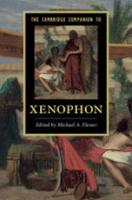
CUP (2017) h/b 420pp £80 (ISBN 9781107652156)
The editor notes that few twentieth century scholars wished to be Xenophon’s companion, despite his popularity among Romans, Greeks, and even Machiavelli. While opinion remains divided whether Xenophon was a facile dunce-like mind or an innovative but reticent genius of many a genre, the twenty-something authors congregated here err on the generous side (e.g. Edith Hall: ‘Xenophon: Magician and Friend’). Certainly, his fortunes have surged in the last two decades after a wide and deep troth in which superficiality was more than presumed (105). When Xenophon writes less well than earlier—or later—congeners, his defensive admirers assign him the merit of novelty or clarity. Not many have noted that he was a ‘managerial guru,’ but none here dance the ‘ironic Xenophon,’ a Socratic disciple who meant the opposite of what he writes. Tolstoy cherished the Anabasis, but not because he believed Xenophon was flirting with subverting generic expectations.
Five well-chosen headings explore ‘Contexts,’ ‘Individual Works,’ ‘Techniques,’ ‘Major Subjects,’ and ‘Reception and Influence.’ The first section surveys his relation to philosophy, political thought, and historiography. Reticent Xenophon’s apparent wish to ‘continue,’ complete, and then extend (after Hell. 2) Thucydides’ unfinished History of the Greatest War (truncated at 411 BC, not the indicated 404) found competitors, such as Theopompus. Cratippus rejected both the Attic master’s chronological organization (and telos; see N. Luraghi 88) and the exiled continuator’s annoyingly moralizing bent. Luraghi insightfully points out (90 n.22) that no one took up Xenophon’s epilogic invitation to continue his work from 362 BC. Xenophon’s long paragraph introducing Sparta’s loss of seized Thebes small-mindedly manages to avoid naming the Thebans’ liberator, Xenophon’s enemy, Pelopidas.
The second section traverses specific works in Xenophon’s wide-ranging oeuvre, from Anabasis, Hellenica, Apology, Memorabilia, Symposium, Oeconomicus, Cyropaedia—most vexingly enigmatic in purpose and genre, to the numerous ‘Small Works’ (J. Dillery). Examined ‘techniques’ (third section) range from vocabulary and syntax to authorial voice, narrative style, and speeches. V. Gray’s chapter necessarily struggles with presenting peculiarities of ancient Greek word order and rhetoric to potentially Greekless readers.
The ‘subjects’ (fourth section) chosen to inspect are Xenophon as historian, leader, and observer of Athens, Persia, and Sparta. P. Christesen’s entry deserves note for its humility and even-handedness in measuring the ancient essayist’s enthusiasm and disapproval for Spartan mores and current, often ‘pernicious’ practices at home and abroad (with acute critique of Leo Strauss’s cryptic, eccentric ironist). Since the chronology of Xenophon’s works itself remains sub iudice, it is refreshing that interpretations here do not depend on untestable determinations of date. (The appended Chronology tellingly includes no such dates.)
Conversely, the self-imposed limitations of synchronic interpretations of all of one, or more works, on any specific question disallow development or Xenophon’s change of mind on hotly contested issues such as the eccentrically negative chapter 14 of the Constitution of the Lacedaemonians. The practical Xenophon offers advice, direct (Lac. Pol., Agesilaus, Memorabilia, Poroi, Hipparchicus) and indirect (Anabasis) on training troops and horses, increasing Athenian revenues, social respect, compelled and willing obedience (Oec. 21.12), and self-restraint. These exhortations elicit yawns among modern readers uncomfortable with prosaic piety and didacticism.
The fifth section scrutinizes Xenophon’s reception and influence in imperial Greece, the renaissance, and the modern world. Testimonies to Xenophon’s literary significance as thinker, lucid prose-stylist, and educative model begin early and last late, e.g., Cicero, Arrian, Dio, and Chariton through Photius. Xenophon the authority is ubiquitous. Then, Valla, Filelfo, Machiavelli, and Erasmus, Castiglioni, Elyot, etc., gushingly praise the now little-read Cyropaedia—perhaps admiring Xenophon’s benevolent despot as much as his sheer accessibility. The eighteenth century reduced the exemplary stature of Xenophon’s Cyrus; he had become representative of petrified pedagogy (N. Humble, 431). Xenophon’s patient Xenophon in the Anabasis came to supplant royalty as paradigm of manly behavior. Ideological pressures intervened as republicanism waxed and monarchism waned. T. Rood traverses recent British stereotypes ranging from the charming and amiable Xenophon (Shaftesbury) to the smug Tory and Anglican Establishment man. Indeed, Xenophon has been characterized as a true Christian before Christianity (440, Lemprière). Rood surveys the insufferably boring exile and the renegade ingratiating himself with his Spartan hosts in exile (442, Niebuhr). Bypassing the esoteric ‘Great Mind’ whose philosophical efforts seem paltry in Platonic comparisons, Rood resists the rehabilitative Tendenz that infuses many chapters here and sporadically a few cabbalistic political philosophers.
Xenophon’s dedication to piety finds mention in various contributions (e.g., John Marincola’s, 110-12: ‘Divination is everywhere’), but no extended analysis—divinity, gods, and piety are absent entries from the otherwise thorough index. ‘Xenophon did believe in a providential divine’ (Hall, fairly citing John Dillery’s Xenophon and the History of his Times (1995) on the notorious passage Hell. 5.4.1). Xenophon’s ubiquitous gods interfere with the recuperation of his ambivalent reputation.
Xenophon’s impressive variety may impel new readers to savor the ‘Attic bee’s’ sweetness. Older, more dismissive hands can profit from the contributors’ enthusiasm for an author who exceeds modest expectations. A silk purse may hide in the sow’s ear—or vice-versa. Flower’s Companion introduces well a prolific writer and complements Vivian Gray’s Oxford Readings in Xenophon (2010).
Donald Lateiner—Ohio Wesleyan University
